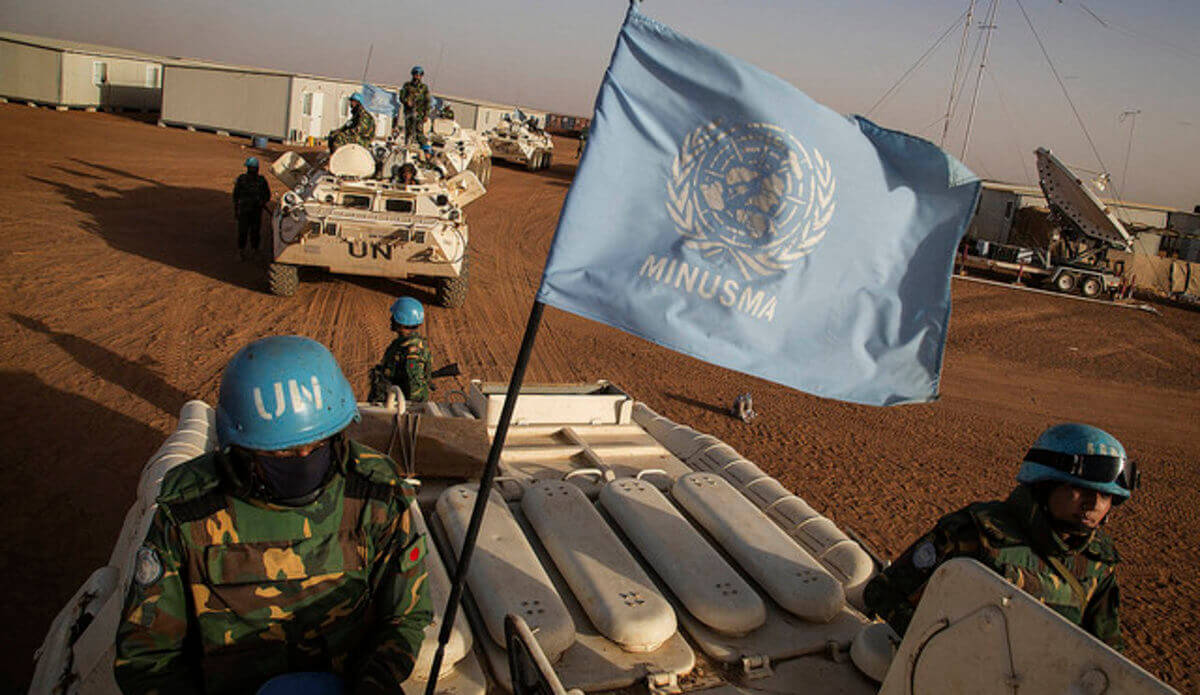In a growing indication of the continued instability and violence in Mali, four United Nations (UN) peacekeepers were killed and five were injured by armed insurgents on Wednesday, the UN peacekeeping mission MINUSMA revealed. Their convoy was struck by an improvised explosive device (IED) and then sustained gunfire in the Timbuktu region. The peacekeepers were able to drive the attackers away and then evacuated the injured troops via helicopter.
UN Secretary-General António Guterres’ spokesperson, Stéphane Dujarric, released a statement condemning the attack and said that it could constitute a war crime, and thus called on Malian authorities to “spare no efforts in identifying and promptly bringing to justice the perpetrators of this heinous attack”.
MINUSMA first came into force in 2013, a year after terrorist groups seized control of swatches of the country’s northern region. The mission has now sustained 236 deaths since it was established, while 358 personnel have suffered “serious injuries”.
This latest attack appears to follow a recent trend of attacks on foreign troops in Mali. Earlier this month, Al Qaeda claimed responsibility for killing three French soldiers in Hombori area in the central Mopti province. A few days later, two more French soldiers were killed, bringing the total of French soldiers killed in the country since 2013, when they first launched counterterrorism operations in the Sahel, to 50. France has over 5,000 active troops in the country.
Extremist violence has tainted Mali since 2012, which marked the rise of a brutal jihadist insurgency in the region. Following this, France, a former colonial power in Mali, spearheaded Operation Barkhane, a counter-terrorism military operation, in 2013. However, jihadists have continued to orchestrate violent attacks across the region, leading to the death and displacement of thousands. Moreover, large parts of Mali continue to remain outside the control of the government.
The new interim government came into power following a military coup on August 18, in which erstwhile President Ibrahim Boubacar Keïta and Prime Minister Boubou Cissé were ousted from power. Thereafter, Mali’s military junta, headed by Assimi Goïta, appointed former defence minister Colonel Major Ba N’Daou as Mali’s interim president for 18 months. N’Daou then appointed former foreign affairs minister Moctar Ouane as the country’s new prime minister.
After initially levelling sanctions against Mali for the coup, the Economic Community of West African States (ECOWAS) soon placed its trust in the interim government and lifted the sanctions. It has even rescinded its earlier demands of Keïta being reinstated into power and approved the military junta’s assembly of a transitional government and promise of a return to civilian rule after 18 months. And just this week, the ECOWAS’ commission on Mali, led by former Nigerian President Goodluck Jonathan, expressed the Community’s confidence in Mali’s interim administration transitioning to civilian rule within the stipulated 18-month deadline.
The military coup was driven by public discontent, which manifested itself in the June 5 Movement (5M), led by a powerful imam, Mahmoud Dicko. Alongside economic concerns, demonstrators accused Keïta of failing to tackle jihadist elements in the north that are now spreading to the centre.
However, it appears that, despite a change in government, these concerns have still not been addressed, which has prolonged the presence of international actors and placed their personnel in harm’s way.
On Monday, the EU civilian mission European Conference on Antennas and Propagation (EUCAP) Sahel Mali extended its mandate until 31 January, 2023, and added a further €89 million to the mission’s budget. EUCAP Sahel Mali, which was established in 2015, is tasked with “assist[ing] and advis[ing] the Malian internal security forces by supporting a gradual redeployment of Mali’s civilian administrative authorities to the centre of Mali”. Its personnel support the national police, the national gendarmerie, and the national guard and coordinate closely with MINUSMA.
Interpol, too, recently conducted a seven-day operation between November 30 and December 6 that sought to “illicit firearms, ammunition and explosives, and disrupt the trafficking networks used to supply terrorists across West Africa and the Sahel”. They seized: 0 firearms, 40,593 sticks of dynamite, 28 detonator cords, 6,162 rounds of ammunition, 1,473 kilos of drugs (cannabis and khat), 2,263 boxes of contraband drugs and 60,000 litres of contraband fuel.
The latest attacks on UN and French troops underscore the continued volatility in the country and demonstrate the expanding reach and power of armed insurgents and militant groups.
Armed Insurgents Kill Four UN Peacekeepers in Mali, Demonstrating Continued Instability
UN Secretary-General António Guterres’ spokesperson, Stéphane Dujarric, said that the attack on MINUSMA personnel could constitute a war crime.
January 15, 2021

SOURCE: UNITED NATIONS
